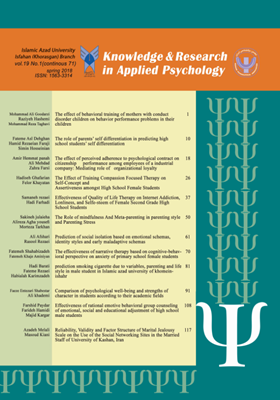The role of parents’ self differentiation in predicting high school students’ self differentiation
Subject Areas : EducationalFateme Asl dehghan 1 * , hamid rezaeian faraji 2 , simin hosseinian 3
1 - Consulting, University of Alzahra, Tehran, Iran
2 - Academic member, University of Alzahra, Tehran, Iran
3 - Academic member, University of Alzahra, Tehran, Iran
Keywords: self-differentiation, Parents, high school students,
Abstract :
The purpose of this study was to explore the role of parent s’ self differentiation in predicting high schoolstudents’ self differentiation. The research was a descriptive correlational study. The population consisted of all high school students of Tehran. For this study a random cluster sampling method was used and 283 high school students were selected. The participants and their parents completed the Differentiation of Self Inventory (short form; Drake, 2011). The results of stepwise regression showed that the component of emotional reactivity of fathers’ self-differentiation could predict their sons’ self-differentiation (15%), whereas the component of I position of mothers’ self-differentiation could predict their sons’ self-differentiation (7%). Regarding female students, it was revealed that fathers’ fusion with others (7%) and mothers’ emotional reactivity (5%) would affect the self-differentiation of them. Other Components of self- differentiation of parents showed no role in this anticipation.
بابای خاکیان، ز؛ زکییی، ع؛ نقشینه، ط. (1394). رابطة تمایزیافتگی خود در مادران و همبستگی خانوادگی با اختلالات رفتاری کودکان. مجلة پزشکی ارومیه، 26 (4)، 343-334.
بلیاد، م؛ ناهیدپور، ف؛ آزادی، ش؛ یادگاری. (1393). نقش خانوادة اصلی در تمایز خود و تعارضات زناشویی. روان پرستاری، 2 (2)، 91-81.
پیوسته گر، م؛ بشارت، م؛ پژوهینیا، ش؛ و سیفی، م.(1391). تبیین آسیبپذیریهای روانی بر اساس سبکهای دلبستگی در دانشجویان دانشگاههای مختلط دولتی تهران، دانش و پژوهش در روانشناسی کاربردی، 13 (1)، 38-29.
رحیمی، م.، آشفته تهرانی، ا.، و حضرتیصومعه، ز. (1390). عوامل اجتماعی مؤثر بر شکاف بین نسلی. مطالعات جامعهشناختی ایران، 1(3)، 98-79.
سلطانی علیآباد، م؛ امیرجان، س؛ یونسی، ج؛ ازخوش، م؛ عسگری،ع. (1391). اثربخشی آموزش مهارتهای ارتباطی بر سطح خود متمایزسازی پسران نوجوان. فصلنامة رفاه اجتماعی، 12 (44)، 92-69.
فخاری، ن؛ لطیفیان، م؛ و اعتماد، ج. (1393). بررسی ویژگیهای روانسنجی فرم کوتاه پرسشنامة تمایزیافتگی خود در دانشجویان ایرانی، فصلنامة اندازهگیری تربیتی، 15 (5)، 57-35.
کاظمیان، س؛ و دلاور، ع. (1390). بررسی رابطة بین تمایزیافتگی با میزان تمایل به اعتیاد در مردان متأهل، فصلنامة نظم و امنیت انتظامی، 4(4)،، 115-105.
محسنی، ه. (1393). بررسی رابطة بین خودمتمایزسازی مادران با تعارض والد فرزندی و مسئولیتپذیری دانشآموزان دختر دوره راهنمایی. پایاننامة کارشناسی ارشد، دانشکده روانشناسی و علوم تربیتی، دانشگاه علامه طباطبایی.
مؤمنی، خ؛ و علیخانی، م. (1392). رابطة عملکرد خانواده، تمایزیافتگی خود و تابآوری با استرس، اضطراب و افسردگی در زنان متأهل شهر کرمانشاه. فصلنامة مشاوره و رواندرمانی خانواده، 3 (29)، 320-297.
یگانه فرزند، ه. (1392). اثربخشی آموزش تحلیل تبادلی بر افزایش خودتمایزیافتگی مادر و فرزند. پایاننامة ارشد مشاوره خانواده، دانشکده مشاوره، دانشگاه علوم بهزیستی و توانبخشی.
Amie, A. (2009). Identity development and implication for social problem solving. (phddisertation), University of Houston. (p:78).
Bartle-Haring, S., Brucker, P., & Hock, E. (2002).The Impact of Parental Separation Anxiety on Identity Development in Late Adolescence and Early Adulthood. Journal of Adolescent Research, 17 (5), 439-450.
Bowen, M. (1978). Family therapy in clinical practice. New York: Jason Aronson.
Chung, H., & Gale,
J. (2009). Family Functioning and Self-Differentiation: A Cross-Cultural Examination. Contemporary Family Therapy, 31, 19-33.
Drake, J. R. (2011). Differentiation of Self Inventory –Short Form: Creation and Initial Evidence Construct Validity. (Phd disertation), University of Missouri-Kansas City.
Hosseinizadeh, M. (2014). Examining the Relationship between Differentiation of Self Components and Social Adjustment. Social and Behavioral Sciences, 113, 84 – 90.
Isık, E., &Bulduk, S. (2015). Psychometric Propertise of the Differentiation of Self Inventory -Revised in Turkish Adults Journal of Marital and Family Therapy, 41, (1), 102–112.
Jenkins, S. M., Buboltz Jr, W. C., Schwartz, J. P., & Johnson, P. (2005). Differentiation of Self and Psychosocial Development. Contemporary Family Therapy, 27(2), 251-261.
Krycak, R. C., Murdock, N. L., &Marszalek, J. M. (2012). Differentiation of Self, Stress, and Emotional Support as Predictors of Psychological Distress. Contemporary Family Therapy, 34, 495–515.
Lam, C., & Chan-So, P. C. Y. (2015). Validation of the CHINESE Version of Differentiation of Self Inventory (C-DSI). Journal of Marital and Family Therapy, 41(1), 81-101.
Mehri, Y., Salaria, S. M., SabzeharayeLangroudi, M., &Baharamizadeha, H. (2011). The relationship between differentiation of self and aspects of identity. Procedia - Social and Behavioral Sciences. 30, 733-737.
Peleg, O., Halaby, E., &Whaby, E. N. (2006). The relationship of maternal separation anxiety and differentiation of self to children’s separation anxiety and adjustment to kindergarten: A study in Druze families. Anxiety Disorders, 20, 973–995.
Peleg, O., & Yitzhak, M. (2011). Differentiation of Self and Separation Anxiety: Is There a Similarity Between Spouses? ContemporaraFamily Therapy, 33, 25–36.
Peleg, O., & Rahal, A. (2012). Physiological symptoms and differentiation of self: A cross-cultural examination. International Journal of Intercultural Relations, 36, 719– 727.
Peleg, O., & Zoabi, M. (2014). Social anxiety and differentiation of self: A comparison of Jewish and Arab college students. Personality and Individual Differences, 68, 221–228.
Roelofs, J., Meesters, C., & Muris, P. (2008). Correlates of Self-reported Attachment (In)security in Children: The Role of Parental Romantic Attachment Status and Rearing Behaviors. Journal of Child and Family Studies, 17, 555–566.
Ross, A. S., & Murdock, N. L. (2014). Differentiation of Self and Well-being: The Moderating Effect of Self-construal. Contemporary Family Therapy, 36, 485–496.
Schwartz, J. P., Thigpen, S. E., & Montgomery, J. K. (2006). Examination of Parenting Styles of Processing Emotions and Differentiation of Self. The Family Journal: Counseling and Therapt for Couples and Familys, 14(1), 41-48.
Skowron, E. A. (2005). Parent Differentiation of Self and Child Competence in Low-Income Urban Families. Journal of counseling Psychology, 52(3), 337-346.
Tabitha, Y. l. (2014). Spirituality and Differentiation of Self of Parents Living in the city of Sadness. Mental Health, Religion & Culture, 17(7), 655-664.
Yang, Q., Fuligni,. J., Galvanb, A., &Telzera, E. H. (2015). Buffering effect of positive parent–child relationships on adolescentrisk taking: A longitudinal neuroimaging investigation. Developmental Cognitive Neuroscience, 15, 26–34.
_||_

